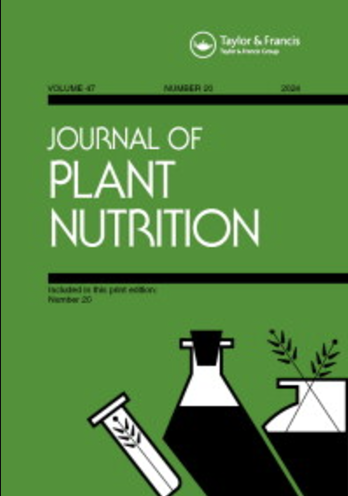印度西北部不同小麦品种的产量和质量受叶面喷施氮、钾、硒和锌农艺生物强化的影响
IF 1.6
4区 农林科学
Q3 PLANT SCIENCES
引用次数: 0
摘要
农艺生物强化仍然是提高小麦产量和质量、同时减轻环境压力的一个关键重点领域。微量营养素缺乏,尤其是铁(Fe...本文章由计算机程序翻译,如有差异,请以英文原文为准。
Yield and quality of different wheat cultivars as influenced by agronomic biofortification of N, K, S and Zn through foliar sprays in North-Western India
Agronomic bio-fortification remains a crucial focus area for enhancing wheat productivity and quality while alleviating environmental pressures. Micronutrient deficiencies, particularly in iron (Fe...
求助全文
通过发布文献求助,成功后即可免费获取论文全文。
去求助
来源期刊

Journal of Plant Nutrition
农林科学-植物科学
CiteScore
4.40
自引率
4.80%
发文量
238
审稿时长
24 months
期刊介绍:
Journal of Plant Nutrition serves as a comprehensive, convenient source of new and important findings exploring the influence of currently known essential and nonessential elements on plant physiology and growth. The journal emphasizes high value, intensive crop production in both horticulture and agronomic systems. Beneficial elements, symbiotic relationships between bacteria and fungi and crop yield, and the role of plant nutrients in disease control are some of the topics covered in addition to essential plant nutrients. Refereed by an internationally renowned editorial board ensuring the high level of scholarship, Journal of Plant Nutrition provides insightful coverage of nutritional topics, such as:
-Hydroponic and greenhouse crop nutrient requirements and factors influencing plant nutrition
-Nutrition involving container production
-Media analysis of pine bark, peat, and artificial media
-Interpretation/correlation of soil and plant analysis
-Intensive production of agronomic and vegetable crops
-Production and nutritional requirements of fruit, ornamental, floriculture, tropical, and foliage plants
-Use of precision agriculture for nutritional requirements of crops
-Plant growth promoting bacteria and elemental nutrition interactions as related to crop yield
Journal of Plant Nutrition serves as a platform for researchers to present their findings to an international audience, which will help to develop research programs that will further our knowledge of plant nutrition. It is also an invaluable resource utilized by growers and consultants to develop operational fertility regimes that are based upon the current peer reviewed publications.
 求助内容:
求助内容: 应助结果提醒方式:
应助结果提醒方式:


